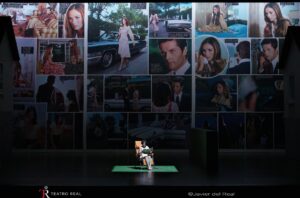
Teatro Real de Madrid 2022-23 Review: Il Turco in Italia (Cast B)
By Mauricio VillaSpanish soprano Sabina Puértolas was scheduled to perform a single show of “Il Turco in Italia” on June 2, 2023, with cast A, but because of the cancellation of soprano Lisette Oropesa, she wound up singing back-to-back performances on June 1 and 2.
Struggling Singers
She has a lirico-leggera voice, marked vibrato, modest volume but a present middle register. The problem was that her voice was not even, and there were changes in timbre and projection. She produces a round consistent sound up to A natural, but when she’s singing upwards, such as during the scales of her entrance aria, “Non si da follia Maggiore,” the voice loses its brightness and roundness; as a result, the projection decreases and her voice sounds tired and airy.
She has a ringing top register, which she displayed with the strong final D natural of her final aria and cabaletta “Squalida veste….Ah! L’infelice.” She added some staccato high notes in the verse’s repetition “Un marito di tal fatta” during her first act duet with Geronio, including a final strong high D once more. But even with this extra incursion in the top range, it was noticeable that the soprano was more comfortable in the middle range.
The Italian tenor Anicio Zorzi Giustianiani sang the ungrateful role of Narciso, whose dramatic weight is weak and unimportant in the plot but whose tessitura is exceptionally high in his various interventions, constantly singing between high As and high C. He has a lirico-leggero voice, whose timbre sounds a bit guttural and posses’ modest volume. Giustianiani was recovering from a cold (he had to mark his part and even sing with a mask), and even if there was no previous announcement, I could not tell if he was feeling 100 percent.
He sang the whole part on key and did not fail a single note, although the A naturals and B flat of his entrance aria “Un vago sembiante” sounded pushed. Again, the top range of the first act quartet, notably the As and B flats, sounded strangled. The high notes of his final short solo of the first act ensemble, “Per chè mai se son tradito,” were also pushed and forced. But I don’t want to insist on this as it was a continuum throughout the performance, which could be the aftermath of being sick.
The Strong Performers
Romanian bass Adrian Sâmpetrean sang the title role. He possesses a strong but flexible dark voice giving a solid presence to the part of the sensual Turk. He sounded agile and fast in the multiple roulades and fast scales written for this role; this was best exemplified during his entrance cavatina and subsequent duet with Fiorilla. He portrayed a funny character with memorable moments, most memorably during his duet with Geronio in Act two, “D’un bell’uso di Turchia!” which was the most comical number of the night; he even included an impossible high G on “D’involarla.” His interpretation was hilarious and energetic, managing the physical demands of Pelly’s staging.
Pietro Spagnoli sang Don Geronio. His voice, with modest volume and weight, seemed too lyrical for this role. Rossini buffo roles, like this one, usually portray older men, and with the tessitura uncomfortably high—constantly navigating around Ds and Es—demands some vocal density. But it was clear that the singer adapted the role to his qualities and portrayed a younger Don Geronio, including a strong sustained high G in his Act two duet with Selim in “Sicuro!” His interpretation was funny and amusing, avoiding the typical “buffo clichés,” while singing beautiful vocal lines. He was warmly rewarded by the audience for immaculate and clear diction in the multiple “parlato” sections of the role, like in the impossibly fast and long lines of his second act aria “Se ho da dirla avrei molto piacere (which he sang in one fiato).”
Mattia Olivieri sang the role of the poet Prosdocimo. His lyrical baritone voice has a beautiful, warm timbre and easy high notes. He effortlessly emitted a high G on “colazione” in his first intervention and the multiple interpolated high notes, like a beautiful A natural on his final “si, si, sará!” He sang with brightness and easily hit the high F sharp on “Per che?” during the trio of Act one.


